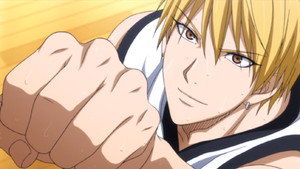Kuroko's Basketball
Episode 3
by Lauren Orsini,

The last episode of Kuroko's Basketball established Haizaki as a textbook villain, somebody with no regard for sportsmanship, whose special power is actually to steal people's moves. Episode two pitted him against the far more sympathetic Kise Ryouta, whose model good looks and winning personality make him a friend to our main characters. Episode three complicates everything, and shows us that good and evil are never as simple as they seem.
Haizaki and Kise's personalities may be very different, but constant camera closeups portray their basketball court moves in much the same way. This episode covered a match between two different teams, but we rarely saw anybody other than the rival aces. We usually see only a third of Haizaki or Kise at a time—faces when talking, arms when shooting, or feet when dribbling. Full body shots are reserved only for their most extreme moves. This not only shows us where to focus, but creates parallels between their abilities.
In the end, however, it's their differing emotional states that decide the game. For Kise, it's a word of encouragement from Kuroko. As usual, Kuroko's conscious decision to become visible is his power, whether on the court or the sidelines. The musical score, always used sparingly, goes completely silent when all eyes are on Kuroko. For Haizaki, it's a demon from the past (Akashi) that makes this villain fall predictably. When Haizaki becomes a much more sympathetic character in defeat however, the scenario becomes less predictable.
"There really are bad guys... and scary guys out there.” Haizaki recalls his middle school basketball captain, Akashi, telling him this when he was instructed to quit the team. This is definitely foreshadowing—Akashi can only mean himself. The lesson of Kuroko's Basketball is that the Generation of Miracles, no matter how gently portrayed, are monsters. Their power has the ability to crush other players, to make basketball a miserable chore. Akashi, with his ability to control the Generation of Miracles, is perhaps the biggest monster of them all.
In contrast to Akashi's quiet control and insidious manipulations, Haizaki's bad boy act breaks down into bluster. His claim that he doesn't care about basketball becomes hollow. His bad attitude becomes a prideful defense against his feelings of rejection. As Haizaki crumbles, Kise becomes cartoonishly strong. On the sidelines, Momoi and Aomine attempt to give a technical explanation for his newfound powers, but it rings false like the junk science it is. Kuroko's Basketball isn't realistic and attempts to justify its players' crazy actions just bring viewers out of the moment. If I want real basketball, I'll turn on ESPN.
In the end, Haizaki and Kise were far more similar than they seemed, both exhibiting vulnerabilities to the encouragement or discouragement of those around them. With their overblown powers, these weaknesses keep them relatable. Giving viewers steady access to their shifting emotional states keeps this story engaging.
Rating: B+
Kuroko's Basketball is currently streaming on Daisuki.
Lauren writes about anime and journalism at Otaku Journalist.
discuss this in the forum (145 posts) |
back to Kuroko's Basketball
Episode Review homepage / archives